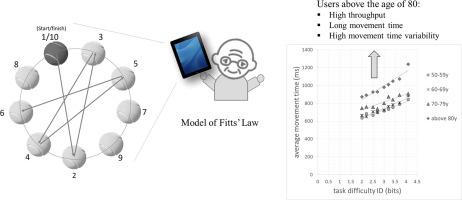Journal of Biomedical informatics ( IF 4.0 ) Pub Date : 2020-05-26 , DOI: 10.1016/j.jbi.2020.103457 Chiuhsiang Joe Lin,Sui-Hua Ho

|
Purpose
As the population ages, so do the potential users of technology, and older adults’ behaviors when using mobile device interfaces are becoming increasingly important. A representative model for detecting older adults’ behaviors and performance on the use of mobile device interfaces is needed to provide individualized designs. This research aimed to investigate the applicability of the broadly used model of Fitts’ law to detect the progressive changes in the use of mobile device interfaces in older adults. The effect of experience with using technology on performance on a Fitts task was also examined.
Method
A sample of 135 older adults was recruited to test the application of Fitts’ model to the use of technology by older adult users. Each participant was asked to finish tasks at 9 levels of difficulty, from easy to difficult, in a multidirectional tapping task. Analysis of variance was employed to examine the effect of age on performance on the Fitts task, movement time, and the standard deviation of movement time. Stepwise regression was used to investigate how well age and technology use could predict performance on the Fitts task.
Result
Performance on the Fitts task was sensitive to the gradual changes in abilities with aging. Rather than the amount of experience in using technology, age was the stronger predictor of older adults’ performance on the Fitts task. Additionally, compared with the younger groups, the users above 80 years old demonstrated significantly higher behavioral variation during the use of mobile device interfaces.
Conclusion
This research confirmed that Fitts’ law is applicable to the evaluation of the effects of aging on the use of mobile device interfaces. Adults above the age of 80 years should be a major focus for special individualized interface design. This finding can inform future designers and researchers in the development of individualized interface designs for older adult users to enhance their user experiences of mobile device technology.
Relevance to industry
Future designers and researchers can apply the finding on Fitts’ law in this research to develop user-friendly interface designs for mobile technology for older adults and thereby improve their user experiences to enhance their independence and quality of life through the use of technology.
中文翻译:

使用菲茨定律模型预测在逐步老化过程中移动设备接口的使用。
目的
随着人口的老龄化,潜在的技术用户也越来越老,老年人在使用移动设备界面时的行为变得越来越重要。为了提供个性化设计,需要一种用于检测老年人在使用移动设备界面时的行为和性能的代表性模型。这项研究旨在调查广泛使用的菲茨定律模型在检测老年人使用移动设备接口的渐进式变化中的适用性。还检查了使用技术对Fitts任务的绩效产生的影响。
方法
招募了135个老年人样本,以测试Fitts模型在老年人用户使用技术方面的应用。在多向攻丝任务中,要求每个参与者以9个难度级别(从容易到困难)完成任务。方差分析用于检验年龄对Fitts任务表现,运动时间和运动时间标准偏差的影响。使用逐步回归来研究年龄和技术使用情况如何预测Fitts任务的绩效。
结果
Fitts任务的绩效对能力随着年龄的逐渐变化而敏感。与使用技术的经验相比,年龄更能预测老年人在Fitts任务上的表现。此外,与年轻的群体相比,80岁以上的用户在使用移动设备界面期间表现出明显更高的行为变化。
结论
这项研究证实,菲茨定律适用于评估老化对移动设备接口使用的影响。80岁以上的成年人应该成为特殊个性化界面设计的主要重点。这一发现可以为未来的设计师和研究人员提供信息,帮助他们为老年人用户开发个性化的界面设计,以增强他们在移动设备技术方面的用户体验。
与产业的关系
未来的设计师和研究人员可以在这项研究中应用菲茨定律的发现,为老年人的移动技术开发用户友好的界面设计,从而改善他们的用户体验,从而通过使用技术来增强他们的独立性和生活质量。











































 京公网安备 11010802027423号
京公网安备 11010802027423号